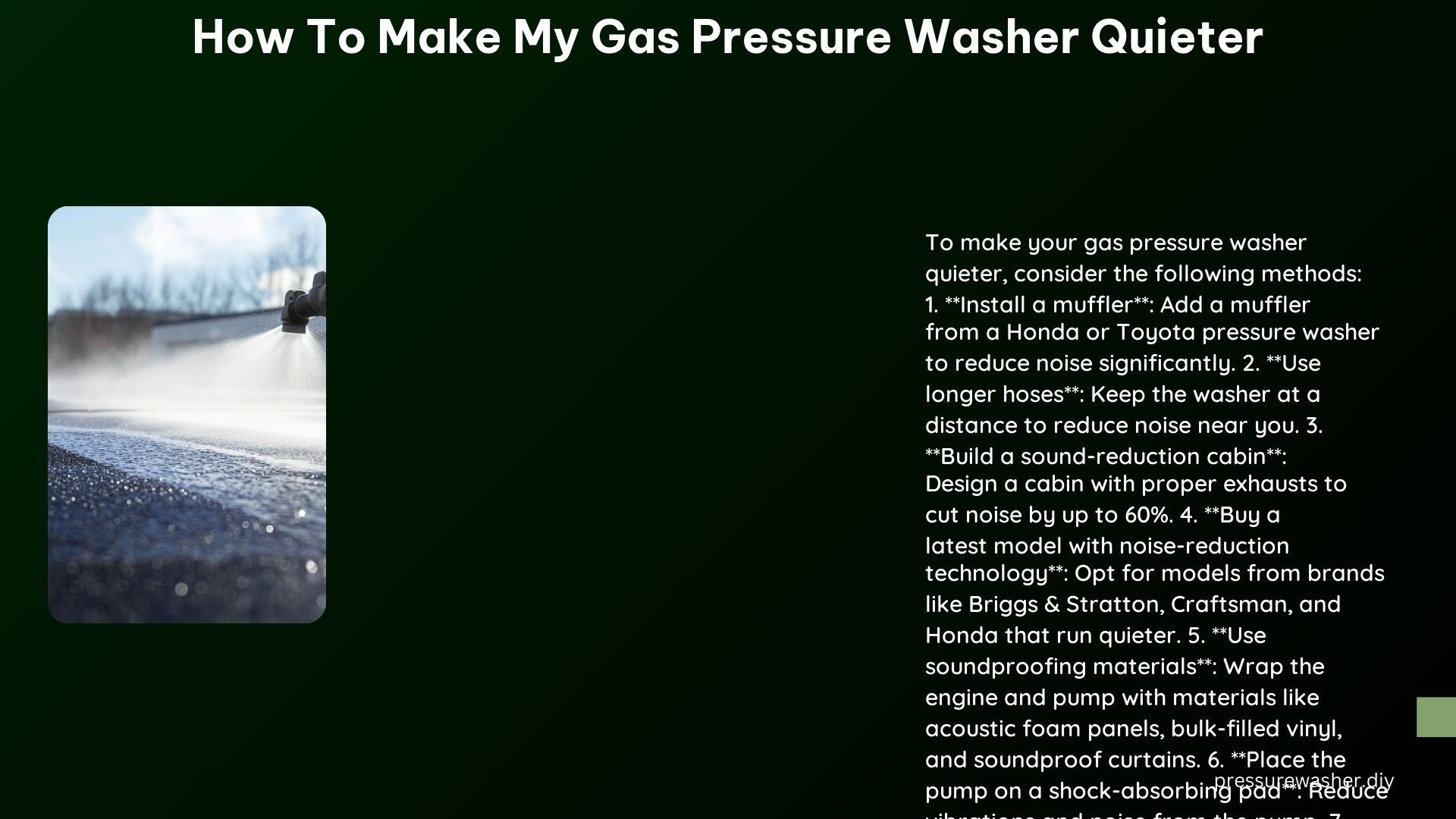Are you tired of the deafening roar of your gas-powered pressure washer disrupting your peaceful outdoor activities? Fear not, as there are several effective techniques you can employ to significantly reduce the noise level and create a more tranquil work environment. In this comprehensive guide, we’ll delve into the details of various methods to make your gas pressure washer quieter, ensuring a more pleasant and efficient cleaning experience.
Install a Muffler
One of the most effective ways to reduce the noise of your gas pressure washer is to install a muffler. Visit a reputable muffler shop and have them install a small muffler, typically sourced from a Honda or Toyota pressure washer. This simple modification can significantly lower the decibel level, transforming your pressure washer into a much quieter machine.
Utilize Longer Hoses

By using longer hoses, you can effectively move the pressure washer away from your immediate work area, reducing the noise that reaches you. This method is particularly beneficial for occasional home users and professionals who need to maintain a quiet environment for their clients or neighbors. Aim for hoses that are at least 50 feet long, as this distance can make a noticeable difference in the perceived noise level.
Construct a Sound-Reduction Cabin
For a more comprehensive noise-reduction solution, consider building a custom sound-reduction cabin around your pressure washer. This cabin should be designed with proper exhaust systems to reduce the noise by up to 60%. Ensure the cabin has easy access to the washer and includes two exhaust fans to maintain proper air circulation and prevent overheating.
Invest in a Latest Model with Noise-Reduction Technology
If you’re in the market for a new gas pressure washer, consider purchasing high-end models from reputable brands like Briggs & Stratton, Craftsman, or Honda. These manufacturers have developed pressure washers with advanced noise-reduction technologies, allowing you to enjoy a quieter operation compared to traditional models.
Utilize Soundproofing Materials
Create a soundproofing box around the engine of your pressure washer using materials such as acoustic foam panels, bulk-filled vinyl, and soundproof curtains. This enclosure will help to dampen the noise generated by the engine. Remember to ensure proper ventilation to prevent overheating.
Place the Pump on a Shock-Absorbing Pad
Vibrations from the pressure washer’s pump can contribute to the overall noise level. By placing the pump on a shock-absorbing pad, you can effectively reduce the transmission of these vibrations, resulting in a quieter operation.
Wrap the Pump with Sound-Absorbing Materials
Similar to the soundproofing box around the engine, you can also wrap the pump with sound-absorbing materials to further dampen the noise. This targeted approach can provide an additional layer of noise reduction.
Utilize Low Noise Nozzles
The pressure at which water is expelled from the nozzle can also contribute to the overall noise level. By using nozzles with larger hole diameters, you can reduce the noise generated by the water flow, resulting in a quieter pressure washer operation.
Incorporate a Noise Reduction Spray Wand
Specialized spray wands designed to reduce the noise generated by the water flow can be a valuable addition to your pressure washer setup. These wands incorporate features that help to minimize the noise without compromising the cleaning performance.
Additional Soundproofing Measures
For even greater noise reduction, consider building an enclosure for your entire pressure washer setup or installing acoustic foam panels on walls and hanging acoustic curtains around the work area. These additional soundproofing measures can further enhance the quietness of your gas pressure washer.
Technical Specifications
- Noise Level: Gas-powered pressure washers typically operate at 85-100 decibels. However, some models with advanced noise-reduction technology can operate as low as 50 decibels.
- Engine Type: Air-cooled engines are generally louder than other engine types, such as those found in electric or battery-powered pressure washers.
Safety Precautions
When implementing any of the noise-reduction techniques, it’s crucial to prioritize safety. Ensure that any modifications you make do not cause overheating, which can damage the equipment and create a fire hazard. Maintain accessibility to all controls, fuel caps, and maintenance points, and avoid contact between sound-absorbing materials and moving parts like the engine pulley or the pump. Additionally, use heat-resistant materials when wrapping parts of the pressure washer, especially near the engine or exhaust system.
By following the techniques outlined in this comprehensive guide, you can transform your gas pressure washer into a much quieter and more user-friendly tool, allowing you to enjoy a peaceful and efficient cleaning experience. Remember to always prioritize safety and consult with professionals when necessary to ensure the proper implementation of these noise-reduction methods.
